Brannon Braga began career as an intern with Star Trek: The Next Generation at the beginning of the fourth season. He went on to have twenty-four TNG writing credits and he was also a co-producer on the show for the final season. Then he went on to co-write the first two TNG feature films, as well as take over as showrunner on Voyager, and lastly, he co-created Enterprise. After his long run with Star Trek, Braga kept busy as writer and executive producer on 24, Salem, Cosmos and currently The Orville. As part of our TNG 30th anniversary coverage TrekMovie spoke to Braga about his time on Trek, including how the show improved with Michael Piller, working within the “Roddenberry Rules” and what it was like co-writing the series finale.
TNG’s “neck-snapping” change in quality under Michael Piller
Star Trek: The Next Generation got off to what most consider a rocky start. You got involved in TNG when – and I believe I am paraphrasing something you once said – “when the show got good.” What were the quintessential things that nailed it as “good” by the time you got on board?
Well I am not going to make the distinction that it got good when I came on board. It had been good for a while. I was lucky enough to come at that time and a lot of that had to do with the writing. What else was there? The cast didn’t change and the sets didn’t change. It was the writing. I think [executive producer] Michael Piller had a lot to do with it. In its third season the storytelling was much sharper. They managed to find ways to create conflict that was believable but not violating [Gene] Roddenberry’s ethos. The story ideas were more grounded. Everything just felt more real. That is all the writing and you have to give Piller a huge amount of credit.
Piller was your first big mentor, is that fair to say?
Without question. It was a really creatively fertile time for all the writers there. Piller kind of assembled an interesting group. He had some experienced and brilliant writers like Jeri Taylor, and then you had us boys. We were in our twenties. We had never worked in television before. It was an amazing core group of guys who learned a great deal working with Piller and Jeri Taylor and Rick Berman. They were all mentors to me. I always tell people breaking into the business, “You will not do it alone. You cannot forge a career alone, you need to have people who take an interest and help you.”
What did you learn, more than anything from Michael Piller? What do you still remember and use today?
It seemed like magic at the time. It seemed like I was watching a magic trick that I didn’t know how to do. I would sit in those story breaks wondering “How in the hell is his brain working so fast?” That he could say “yes” or “no” to an idea. That he could see what act five needs to be. It was just crazy to me. What I remember is how clean his dialog was and how clear, and clarity is half the battle in writing for me. And just the sense of his integrity. Nothing was just tossed off. Whether an episode turned out great or not – we worked very hard on every one and he was our leader and he had a standard of that the shows be good and about something and have depth.
Do you think that if he didn’t come in as showrunner, that TNG wouldn’t have made it?
I have no idea as I don’t know what the ratings were in those first seasons. I can’t possibly speak to that. I don’t know.
But it might not have become as good of a show, perhaps?
I don’t know. I watched the pilot like millions of people and I was really intrigued and I really enjoyed it and then the second episode was kind of indicative of some of issues the show was having. That isn’t to say there weren’t some classic episodes in those first two seasons, but you do have to look at that third season and it is a neck-snapping change in quality, in my opinion. And that can only be attributed to the writing. Had the same regime continued? I don’t know. There were undoubtedly some questionable episodes, but there were some f—king great ones like “Q Who?” with the Borg. There were certain things that lasted that were amazing. So, I don’t know if I could say it wouldn’t have succeeded.
Fitting in to Roddenberry’s future
You have talked about how you and Ron were different, yet you ended up working often together on TNG show and the feature films. He has been outspoken on how he didn’t agree with the so-called “Roddenberry Rules” and recently said that he and the writers hated the replicators because they removed drama. Do you agree with him on those issues?
I can only give you half an answer because half of that involves Ron. But, to my recollection we never really talked about those things all that much. We were just telling stories. I did observe Ron chaffing, but we never had any creative clashes. I think when he came onto Voyager for that brief stint, he had some pretty bold idea on how to make that show kind of like “Year of Hell” the entire time, which was a great idea, but the studio would never go for it.
I do disagree with him, because I think the ethos of Star Trek in a future where humanity gets along and no matter your ethnicity, your so-called disability, everybody has a place…everybody. It is one of the most enduring qualities of the show. It is a future you want to be part of.
I always loved Barclay. You kept bringing him back. Did you like to have someone who really didn’t seem to fit into Roddenberry’s perfect 24th century?
I related to Barclay. Who doesn’t relate to Barclay? I am a nervous flyer and if there was a transporter I would be “No thanks, I’ll walk.” So, I brought him back to do an homage to The Twilight Zone episode “Nightmare at 20,000 feet” with the transporter [“Realm of Fear”], because there wasn’t anyone else you could use. Everyone else was kind of down with it. He was great from that first episode, which was incredibly effective to show that there are still some neurotic people in a Roddenberry universe. And I just love that moment when Picard called him “Broccoli.” He was fun.
Writing the final words for TNG
You have written a number of series finales, but for TNG’s you won a Hugo award…
Still my proudest moment, no offense to the Saturn Awards.
Finales can be very difficult, you look at The Sopranos, or Lost or Enterprise. What was it about writing “All Good Things” that clicked?
First of all, there was so much love for that show in the fan base that it was given a tremendous about of love right up front and bitter sweetness. So I do think the show and the fans’ appreciation and love played a role in it being successful and even being deemed good. At the same time, it wasn’t really the end. Subconsciously Ron and I knew we were doing a movie next so it freed us up a little bit to not be so “We are never seeing these people again.” That took some pressure off. There wasn’t a sadness writing that script. It was pure joy. Whereas Generations was more difficult.
It brings back Q which was a big part of the show and brings it back to the pilot. Then you had this narrative device of going back to the first season of the characters and the current season and the future and what a valentine to all the characters and what a great device. And it isn’t random, as Picard is the fulcrum and is unstuck in time. It had some nice moments like “The sky’s the limit” line at the end. We went round and round about what the last would be. I think even Rick [Berman] got involved. We paid attention to every detail.
More to come
This is just the first part of our special TNG 30th anniversary interview with Brannon. Look for part 2 coming soon.

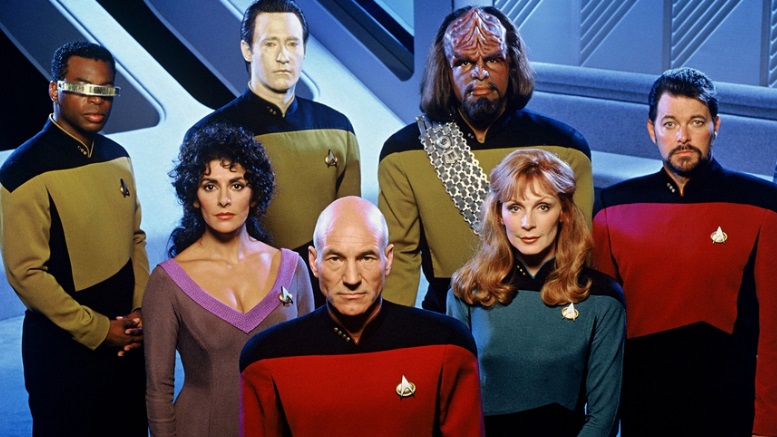
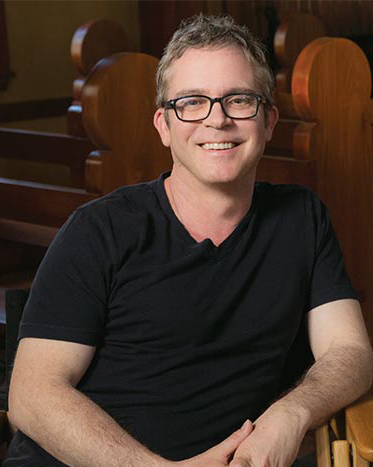
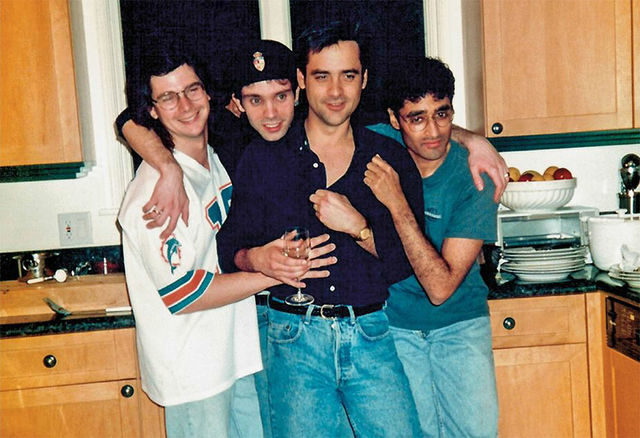



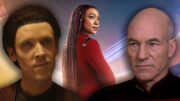
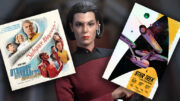
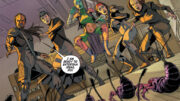

Man…if all good things had been the film instead. With the last enterprise being the TOS film version… could have rocked
I agree! That’s how you could easily bring in Kirk and crew if they really wanted to do something like that. And that would have been a worthy TNG film.
Yup. Since they did a “time travel” gimmick that made sense for All Good Things, they had to come up with something different for Generations and it just didnt work.
Sure, you’d have to punch up the story, more action etc. But All Good Things expanded do be a feature film with TOS films Enterprise/crew being the ship in the past would make a lot of sense. Picard has to try to convince Kirk to work together…maybe they are both being moved through time, changing places etc. Who knows.
The idea of something so monumental, only the combined greatness of Picard & Kirk can save the day..and Q makes it happen.
That the TNG writers made the death of James T Kirk and the final mission of the TOS crew a non-event while at the same time the Enterprise-D, the flagship of the Federation, goes down to a broken down old Bird of Prey is the definitive testament to TNGs contribution to Trek in the long run.
I’m probably about the only person I know who didn’t hugely care for All Good Things. It’s fun and I liked the character moments and the symmetry to the pilot with Q…but all the endless tech-talk about the ‘anomaly’ also highlights TNG’s weakest points too. The root of the story is a space anomaly, which is a totally abstract concept and just not hugely exciting.
I’m with you. I also hate reset time travel stories (oh look – nothing in this episode was of consequence, tons of cheating).
@Cmd. Bremmon — with all due respect, “City On The Edge of Forever” was a reset time travel story, and it’s considered one of the best in the franchise. I understand what you’re saying, but at the end of the day, if you don’t have a reset story with time travel, then you end up with the Kelvin Universe. While that’s interesting in of itself, it’s not really the reason we tune in week after week. The problem really becomes, that unless someone prevents them from resetting the time line, there’s no reason they can’t do it. Otherwise it becomes a whole different story. Stargate SG-1 Actually dealt with this in an interesting way on one of their movies: CONTINUUM. The team wanted to reset the timeline, but the alternate people’s lives who would be irrevocably altered wanted none of it. Yet the audience were almost certainly rooting for them to do it.
So I DID love City on the Edge of Forever which is why I wouldn’t ban them entirely. It did have epic consequences, Kirk had to let the woman he loves die to save the entire human race.
How about Picard, what sacrifice did he make? I guess the movies redeem some of it. Now the Enterprise-D gets destroyed (by a 50 year old bird of prey), Data dies? I suppose the Klingons do not take over the Romulans?)
@Cmd.Bremmon — actually “All Good Things” I don’t really consider a time travel episode, they essentially say as much in the episode, in that none of Picard’s actions in the past or present affect the present or future. In other words, a Q simulation, which is one of the reasons why I hate Q. However, the net effect was the same, as any time travel story — to make the character see something they hadn’t before, along with the audience. That said, devoting an entire season to Time Travel, as they did on ENT was a huge mistake. The “Temporal Cold War”, really?
I think the difference between ‘City on the Edge of Forever’ and ‘All Good Things’ for me was that ‘City’ was very much rooted in a very human story – Kirk falling in love and having to sacrifice the woman he loves to restore time. The problem with ‘All Good Things’ was the solution to the plot wasn’t something universal to do with love, loss or sacrifice — it was a TACHYON PULSE or something. Ugh. Seeing Kirk have to watch the woman he loves die makes it a powerful, wrenching story. See Picard solve a technobabble paradox is altogether less powerful.
But “All Good Things” was consequential to Picard, in that he came to understand how much the crew of the E-D meant to him. That’s what made it such a satisfying finale for those who loved the show.
Great interview so far. Did Mr Braga know Mr Roddenberry personally or did he come along after he had passed away? Losing him and Michael Pillar were two of the saddest and worst things to happen to Trek, other than losing cast members.
Roddenberry was very much alive when Braga came on board, though his health was declining rapidly and he had pretty much delegated production to Rick Berman.
Stop attempting to butter up fandom Braga and spend the time more productively trying to improve your lousy stories, scripts and non existent characterisation instead.
you are the essence of objectivity.
Pascale and Trekmovie seem to have a very close relationship with Braga. News and interviews about this guy gets posted quite frequently. The Orville gets a weekly review (the most favourable out of any outlet) as well despite the name of this site being trekmovie.
Would have been cooler if more successful names like Ron Moore or Ira Steven Behr got interviewed instead to talk about Roddenberry’s legacy. Then again, access to these guys is a bit more restricted than Braga
But Ira does get interviewed. There were 2 interviews published just within the last few weeks… https://trekmovie.com/2017/07/31/interview-ira-steven-behr-on-revisiting-star-trek-deep-space-nine-with-what-we-left-behind/
Do you even TrekMovie, bro?
LOL, I’ll take that bro
Just goofing. But yeah, they do interview plenty of other Trek writing and producing icons. I do think you’re right about Braga being much more willing to talk frequently though. He seems very engaging and open. I follow him on Facebook and he’s a lot of fun there.
@UAB Yea compared to Ron Moore and Ira that’s definitely the case with Braga. The TR3 podcast at IGN thought it was their greatest achievement when they got Ron Moore onboard for an episode lol. And getting Ira to join Twitter was like moving a mountain according to RHW. These days he’s public to promoted the DS9 doc and HDS’s final film
@Amulius Victor,
“Then again, access to these guys is a bit more restricted than Braga”
Then we have A MAJOR SECURITY BREACH!!
Somehow, Trekmovie managed to secure two in-depth interviews with Ira Steven Behr in July and August of this year alone!
Maybe the fawning over Orville is over now…no review for this week’s episode. I hope it was a paid consideration deal because this site is great and deserves the sponsorship if that was the scenario.
I wont miss the crap of Orville being described as “fair” or “uneven” though, but kudos to the reviewers for their incredible gymnastic abilities to make crap sound decent! lol
Frankly, Brannon Braga’s involvement in the Orville is starting to show. This week’s episode felt like an ununsed Voyager script – and not even a very good one (no wonder, since they recycled all the good ones for Enterprise) ;)
I haven’t seen this week’s episode yet, but I’m looking forward to it. I’m in the group that loves Orville so far. Braga’s influence isn’t necessarily a bad thing to me.
Yep, the verbal gymnastics to describe rubbish is pretty impressive in the reviews lol
Braga’s right: much of the credit for TNG’s creative turnaround should go first and foremost to Michael Piller. I was honored to be able to attend his funeral in 2005, and though he reportedly wasn’t always the easiest person to work for all of his TNG colleagues spoke of him with great affection, even gratitude. For all the disappointments since then, Trek fans who wish to see it continue as a going concern should feel likewise.
I agree. Its Michael Piller who really turned around TNG. Its sad we never hear his name in Star Trek anymore. This man did so much for Trek like so many others. He was just as big on Trek as Rick Berman was post-TOS but he chose to leave Trek basically after Voyager although he came back to write Insurrection. But sadly he was gone too soon.
It’s Gene Coon syndrome with Piller. Harve Bennett felt the same way before there even was a Piller on Trek, noting how GR always got the lion’s share of credit even when others like Coon and Justman were doing the heavy lifting. Look at how little credit Bob Sallin gets for TWOK — about 1% of what Bennett gets, and that’s with Bennett seriously overshadowed by Meyer, who didn’t know squat about economical film production at that point, even if his work on TWO was mostly brilliant.
The pay-it-forward encouraging of beginners, which Coon fostered with David Gerrold and Piller fostered with — well, there’s no telling how many people benefitted from the Piller-instituted spec policy, which Braga got them to abandon about a dozen years later — now that’s a worthwhile legacy.
Agreed about Gene Coon, and apparently Nick Meyer has come to feel the same way about Bob Sallin (though you sure wouldn’t know it from reading Meyer’s very entertaining THE VIEW FROM THE BRIDGE). Coon was absolutely responsible for not only writing (or rewriting) some of TOS’ best scripts, but for coming up with a number of its defining concepts as well. He should probably also get the credit for David Gerrold’s career as a middling-to-great SF author and occasional Hollywood scrivener (full disclosure: I had the opportunity to work with Gerrold some years back and we regrettably didn’t get on all that well, so I can only hope that’s a fair assessment.) That said, a few caveats: while Coon was in my view a better teleplay writer than Roddenberry even at his best, he was also a more conventional one, and his penchant for ending otherwise thoughtful episodes with a bridge jokefest eventually got tiresome, and could even backfire on occasion. Under the considerable pressures of his job he was unapologetic about reusing ideas long past their prime, such as Earth-parallel stories. And his method of getting out of his contractual obligations to the series by submitting drivel like “Spock’s Brain” in that terrible third season was not only borderline unethical but puts an unfortunate asterisk on his genuine accomplishments. Well, he was only human like us all, but I see no need to sanctify him at the expense of Gene Roddenberry, Fontana, Justman, et al who also did great work for which they too deserve credit.
Is there any kind of award named after him? That might at least create a niche to help keep his legacy alive as we move further away in time from TNG.
Any chance “Michael” Burnham is a nod?
I have no idea how Fuller came up with Michael’s name, aside from his obsession with naming female characters male names. I kind of suspect he throws darts at a name dartboard and just goes with it. Side note: While previous series of his have had characters with names I liked (Charlie, for instance) I absolutely hate the name Michael for Burnham. It’s jarring. And yes, I know it’s been used as a female name for a handful of women IRL. It’s still just a horrible choice to me.
I understand it’s the name of SMG’s father. And I happen to think it’s pretty awesome! ✌️
Mr Braga,
Would you like to know who I credit with running star trek into the ground so hard that its two de facto reboots are heading into the ground too from the debris bounce?
There is such a thing as debris bounce?
First that I have heard of it.
The only people responsible for Treks ‘demise’, is studio bosses at Paramount, who were the real power bearer’s.
Braga was one man, among various others too, who followed Paramounts directive – make another Star Trek show – and get paid well for it.
What man/woman would turn down a healthy paycheck to keep making a Star Trek show?
@wi-kiry-lan I can only assume Rick Berman? ;)
Brannon Braga gets a lot of hard knocks — some of them deserved — but he also wrote or co-wrote some of the most entertaining episodes of the series, including two of my personal favorites, “Cause and Effect” and the series finale “All Good Things…”
Brannon got to live what most of us dreamed about while watching Star Trek in its second generation of series, so I’m not going to begrudge him trying to recapture that magic with “Orville”, and I wish him the best of luck.
Agreed. I never got the hate for Braga but then I never got the hate for George Lucas. These people aren’t gods, they are just writers. Some will be brilliant, others not so much. I think Braga probably went to the well too often but he has written some of my favorite episodes and films. Although he’s written some of my worse episodes as well (These Are The Voyages….really?). But overall he wanted to make fun and interesting Trek stories and I loved how his brain worked, especially with all the time travel ones.
I just watched the fourth episode of Orville and man that show is really taking great elements of Trek. I honestly thought I would hate it. Instead I’m liking it much more than I imagined. Its not perfect but it actually has a lot of heart. I hope we get that in Discovery in time too.
Tiger2 I’m glad to hear you enjoyed the fourth episode! I haven’t had a chance to watch it yet… saving it for date night tonight :)
Hope you saw and enjoyed it Scott. As I said it wasn’t perfect but I love the heart the show has. I did not actually expect that. I was thinking it would like Family guy vibe where everyone feel like jerks. But the characters are becoming more endearing every episode. I’m liking Discovery so far too but so far its a lot more cynical (which I guess for a war story line is to be expected) but I’m hoping past the pilot we like these characters more and the story start to feel optimistic in time like a lot of Trek. But its still early. Orville though now has my vote for a must-watch show this season.
@Tiger2,
Loved the fourth episode of ‘The Orville’, it was like watching a classic TOS episode this time. The drifting generation ship is a classic sci-fi concept & hasn’t seen it done on TV for some time.
Didn’t expect to see Liam Neeson, that was a nice cameo. Next episode is the one directed by Jonathan Frakes, and they have Charlize Theron as the guest star.
Yes I agree, it felt very much like a TOS episode. I just loved how the analogy was done usine a bio ship and me being an atheist I really grasped this episode a lot. Not trying to dis religion but sometimes it does sound that way to me how people talk about the universe. I always here “Who else created the universe? It can’t be created on its own.” And the natural response is always, “Well who created God then? If he can just pop out of thin air then why can’t the universe itself?” But yeah I’m going into dark territory here lol so I’ll stop.
But really liked the theme in this one.
“It’s turtles all the way down.” There, you have your answer.
Yeah, he had a fascination with time-travel that I don’t share, except for that “Cause and Effect” episode. That was great, since it was more of a reflection of “something is wrong here, in this deja vu about myself, can’t quite put my finger on it…” A psychological mystery more than just time travel. I really liked it.
The fun part for me is watching how each loop changes just. a. little. bit. But mostly because a lot of the episode (well, except for the KABOOM parts) showed us that great poker scene in Commander Riker’s quarters. Who among us wouldn’t love to spend an evening gambling with Riker, Worf, Beverly, and Data?
I really liked “Frame of Mind,” too–very weird and dark and Twilight Zone-ish. That concluding scene with Riker tearing apart the set with his bare hands is one of my favorites in TNG.
I love that one too.
Except my grandmother had multi-infarct dementia (tiny strokes) and didn’t become a hallucinating maniac. Maybe it’s different if you’re a man in his prime.
Well the 3 episodes I’ve seen have essentially been TNG with 21st century characters and jokes. I’m ok with that.
Which Roddenberry vision? The 60s “Wagon Train to the Stars” today’s humanity will make it and continue to better itself despite all the challenges and conflicts where differences can be strengths and we will head out into the frontier or the 90s I’m the messiah, tomorrow’s man in my image will be superior in a conflict free perfect free energy utopia? I think the latter like TNG has aged poorly vs the former. One is fun and one is boring as hell that degrades into Young and the Restless in a holodeck. 60s Roddenberry was a genius and hit gold. Was sad when Roddenbery was upset with Star Trek II et al for following his own guidelines in Trek being Horatio Hornblower / US Navy Destroyer in space. Used to think it was due to enjoying been seen as a prophet/visionary as opposed to “just a writer” but now wonder if has to do with guilt over womanizing. Often wonder if Meyer had done a “next generation” as he indicated with David Marcus (outside of Starfleet), Saavik, etc, USS Excelsior, etc. Or if Enterprise had been a real prequel (humanity seen as primitive recovering from World War 3, conflict with Romulans and Klingons, nuke powered ships without subspace, nuclear weapons, no transporters, etc).
TNG definitely improved when Roddenberry was kicked to the curve. I will agree he probably thought a bit too highly of himself in the later years but he did make two amazing shows even if in reality the credit really goes to others.
But that Meyer idea wouldn’t fly today. MAYBE in the 80s but not today. Its why Discovery and Shenzhou seems more advanced than the Enterprise D and you now have walking holograms lol. But I guess its no worse than the Kelvin films when you now had portable transporters that can get you to the Klingon home world from freaking Earth. But people like cool tech. That’s Star Trek!
I am not sure where it would have gone. David Marcus leading a research colonization enterprise or would he have joined Starfleet? Kirk and crew outside Starfleet on the run after III? Sulu on Excelsior for sure, pretty sure that was what VI tried to setup. Saavik now a Captain on the Enterprise-B? Doctor McCoy retired on the frontier? Would his daughter have shown up, maybe a series lead? Federation trying to lead the evacuation of Qo’nos I assume would have blown up into a major intergalactic crisis thanks to the Romulans (or would you Genesis device the planet – ignore TNG and it is unsavable – fun debates there!). On the tech i personally think that the Star Trek II Enterprise updated is still the coolest ship, visually entertaining bridge, engineering, crowded quarters, takes a beating and keeps on going. Excelsior could have had some fighter shuttles I suppose. Big mistake was Star Trek IV re-consitituting dilithium (source of conflict there) easily solved by that being a temporary phenomena, something you can do once that will give you a week or so of M/AM reactions.
No offense I’m pretty glad we didn’t get any of that. Although it might’ve been a decent Star Trek 3 film if they didn’t have to spend it resurrecting Spock I guess. And I couldn’t stand Kirk’s kid. I was happy when they killed him off in TSFS.
Do you, or anyone else, think it would be great to see a post WW3 story, first contact with Vulcans, fledgling steps of Federation being done?
I personally think the best Trek would have been Enterprise done right – a primitive ship, humanity just pulling together after WW3, humans seen as primitive by Vulcans, shuttles (no transporters yet), armed only with missiles, nukes, shuttles, warp 3, no subspace communications, machine guns and lasers that kill (no phasers on stun yet), Starfleet not even formed yet (maybe United Earth Space Probe Agency) with tons of Vulcans, Andorians. My pilot would have been UESPA in Montana receives a distress call from a Vulcan science ship captured by one of the last Tyranny motherships which the Vulcan embassy sees as unsavable and expendable. Earth sends a rescue ship anyway (which is destroyed). As a gift for saving the crew (at the loss of the ship) Earth is allowed to repair and have the science ship which is the XCV Enterprise. Series would be colonization, first exploration, dilithium mining, first contacts gone wrong (Klingons), loss of a lot of ships. The series would have ended with Vulcans, Andorians, etc are on the verge of bowing down to Romulans, Klingons, etc but Earth rallies them together and proves herself.
Man, if only…
To be honest I’m not sure if thats something a lot of people wants to see. Yeah it sounds fine for us Trekkies but I don’t think that story line would get a lot of new viewers. I thought what they did with Enterprise was fine but they probably needed a bigger story from the outset instead of the TCW.
I disagree. Mainstream audiences I think will identify with limited sci-fi tech with say machine gun battles, space suits and shuttles then they will adults running around in PJs drinking tea on their spaceships while they go play holodeck beaming all over. These days you want a niche audience that will pay anyway (Game of Thrones) versus generic free TV network audiences anyway.
Why does Worf have hair in that pic? Klingons are hairless!
It’s his damned hippie upbringing by humans. He liked hair so much he wore a big wig all those years.
You just hit on something: since Klingons were a stand-in for Soviet Union/Russia, Worf was just trying to put humans at ease by trying to fit in, wearing hair wigs; “see guys. I’m not some big scary lizard. I have hair, like you guys…”.
Lets be fair & honest about this. TNG ONLY existed because the TOS cast would have been too pricey & Gene wanted full creative control again (he signed it away on the movies after STMP was deemed out of control by Paramount execs). TNG was Gene getting fairly paid for his TOS ideas rehashed as TNG. No way to sugar coat Gene walked away or was pushed away after Season 1 of TOS. Gene Coon, Harve Bennett & Nick Meyer deserve as much credit. Berman ONLY deserves credit for strip mining the franchise as per his 8 figure contract. Anyone else was just a TV exec who lucked into the franchise!
Oh yeah…. Berman only managed to oversee the making of about 400+ hours of tv! No small achievement. I dont really like Enterprise, but even that show lasted four seasons, respectable achievement.
LOL you have to love the internet. How it belittles accomplishment when they don’t like someone. Berman over saw more TV than any producer in that period AND four films on top of that. He created 3 of the shows. That is no small achievement. And yes 3 out of the 4 shows went on for 7 seasons each which is amazing for any show. Again, I get sick of all the petty hate on the internet. You don’t have to like everything he did with Star Trek, but he made it into the big franchise we have today.
400 hours of average studio product which was the only thing on offer back in that era is hardly a calling card when he was getting an 8 figure salary!
I don’t think the TOS cast would’ve been too expensive. That wasn’t the issue. And he probably wanted full control though so I agree on that but even with TNG is sounds like he lost that after season 3 and especially when he got sick.
Whatever the reason, we got a show that is probably the most watched Trek to this day and certainly the most content with the most number of episodes and four films.
And yes my guess is he was pushed out TOS as well both the show and films. Which is why I don’t get all the fanfare for that guy. He obviously came up with the premieses of TOS and TNG but so many others made them the successes they were. And Berman deserves tons of credit. There would be no DS9 without him, which is easily my favorite Trek show. But I have liked every Trek show although it took me awhile to finally warm up to Entperise, but I love that one as well too.
Two things… Barclay was just a dull and silly character. Fortunately he didn’t show up often.
And I still do not see why people think “All Good Things” was such a wonderful thing. It was a very pedestrian episode at best. Q held Picard’s hand and pretty much spoon fed him everything. There was no growth for anyone. Braga said he felt freed because he knew the feature was coming next. That might have been part of the problem. It wasn’t the end by any means. Nemesis actually provides TNG a fitting finale. A solid and fun tale and the characters grew and moved on. None of that was present in “All Good Things.”
All Good Things was less about growing the characters and more about a “Valentine” to the fans that they incorrectly thought the Enterprise finale was.
It had time travel, which we love and re-visited the premiere in a neat way, bringing back other characters. It showed us the future, which is always cool. And bookended the series with Q, which seemed appropriate.
So while I agree, All Good Things was not the best episode ever, finales hardly ever are. But it was a feel good episode. And ended things on a happy note. Usually finales want to show us characters moving on or dying.
In that way, because of the film, the finale couldn’t really do anything substantial. It HAD to be fairly pedestrian. Nothing could change. So they had to deliver something really unique – end a 7 year series without changing anything or anyone.
And while Q did hold Picard’s hand, that was to show us growth in the one character they COULD change…and really should have – Q. It showed that everything he did along the way that sometimes seemed like helping, was, in fact, an example of his affection for Picard. Because he clearly DID want to help. He interferred to help humanity.
The only thing I didnt understand (and maybe did quite remember), what caused the issue in the first place… wasnt it Picard beaming the stream in the future, which he wouldnt have done without Q telling him to…
Either way, good episode.
Nemesis had the makings of a great film. But left all the heart, chemistry and fun on the cutting room floor.
Maybe you should rewatch the episode again. A pedestrian affair? with three intersecting time periods, the cooperation of three parallel crews, future interpersonal drama and a different political landscape, and all linking together and tying back in with a key series antagonist and plotline from the pilot episode. I don’t know how you could make an episode less pedestrian. And Q directly helps out only by implying Picard is at fault for the amino acid thing (and since the whole thing was Q’s idea in the first place to try to help Picard out this is a relatively small assist). Otherwise it is a rather difficult ride for Picard having to juggle the time periods and memory issues, and get his friends and staff to go with him without being able to fully explain or justify. As for lessons: Picard learns to loosen up a little, to recognize the family that he has in his staff; Worf and Riker learn to not let any conflicting feelings over Troi get in the way of doing what is right; and the whole senior staff learn that their Captain really cares about them and cares about where the crew goes in the future, and that they need to make an effort not to drift apart. And the viewer gets to see the whole group finally playing around the poker table as one big family.
Nemesis was a disaster from start to finish in terms of concept, plot, cliches, and characterization, and is rightfully low ranked – the one big growth step was the death of Data which was awkwardly shoehorned in via a questionable technobable limitation and then immediately packpeddled via B4 (demonstrated fully in later comics where ‘Data’ comes back).
Perhaps I should rewatch. I only saw it that one time back in ’94 with a group of friends. There were 4 of us. And all of us felt different degrees of being underwhelmed by it all. I suppose to be fair I ought to view it again since so many of stroked that episode over the years. So the following is said only having seen it the one time 23 years ago.
You mention the time period thing. Temporal distortions are a tired staple in Trek. The finale should have stayed away from that if they wanted to make a fresh story. There was no real dilemma. Q all but flat out told Picard everything. Because of that it left the episode rather impotent. There were no stakes. No emotion. There just was nothing going for it. An hour and a half of Picard going nuts and Q telling him everything. The one thing it did that was nice was it bookened the show with a call back to the silly Q trial from Farpoint. Is Picard joining the poker game supposed to be significant? I didn’t find it so. By that point the viewer is just too tired of the same old same old to care.
Nemesis had its flaws but it was better than almost every single TNG episode there was. Even though I didn’t find anything emotional about Data’s “death” it was still the culmination of the Data machine’s programming to learn about the human condition. That was something. Something at that level was completely absent from All Good Things.
Brannon Braga is right about one thing: Michael Piller. In him he had a boss who was an extremely talented, intelligent and self reflective man. That Braga has managed to coast through the TV business for 25 years on the back of his association with him says everything you need to know about either of them.
My god they look like children in that pic. They were that old and writing TNG?!?
I disagree with the comments Braga made about the “Roddenberry rules.” While I do agree that the backbone of Star Trek is acceptance of different types of people I don’t think that means there will be no conflict. People will probably just find other things to argue about. So in that sense I agree with Ron D. Moore. I hope though that are ability to communicate with one another will improve our conflict resolution skills.
All good things should have been the first big TNG movie. Followed by First Contact. I really hope we can one day get a proper TNG movie finale. Nemesis had some good elements…but the whole clone thing and another “Data”….you could tell they ran out of ideas.’
Sadly, another TNG is so unlikely to happen, it is not worth hoping for it to happen. It is 10 years too late, well past any hope. The cast are getting very long in the tooth. Brent Spiner would be playing Grandad Data, like Arnie Grandad T850 in Terminator. Stewart would pass I surpose, he still looks quite good. Jonathan is past it, Marina too.